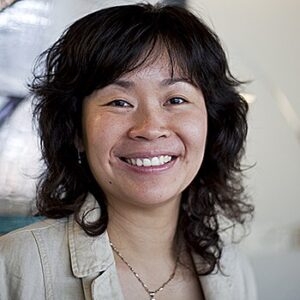
Nina Lin - University of Michigan
Understanding and Harnessing the Power of Microbial Consortia: Systems and Synthetic Biology Approaches
Abstract:
Microbes are everywhere in nature and they live in diverse communities that show remarkable metabolic capabilities and robustness. On the other hand, disruption of microbiome homeostasis and associated changes in the community’s structure/function underlies numerous health or environmental issues. My lab has been developing methods and tools rooted in engineering to study microbial communities in order to discover the underlying cellular and molecular mechanisms. In particular, we have pioneered a technological pipeline, based on nanoliter-scale microfluidic droplets, to co-cultivate sub-communities and characterize interactions between community members. A number of technological modules have been created and the pipeline is being applied to the investigation of a range of health or environment related microbiomes. A second distinct yet complementary research thrust in my lab, inspired by naturally occurring synergistic microbial communities, has been the design and construction of synthetic consortia for microbial engineering and bio-manufacturing. As an example, we have developed a high-throughput strain screening method based on compartmentalized co-cultivation. We have also engineered a portfolio of modular microbial consortia for bioprocessing. For instance, to make use of lignocellulosic biomass, we designed and optimized a consortium consisting of a cellulolytic fungus capable of hydrolyzing hemicellulose and cellulose (main components of lignocellulosic biomass) into mono and oligosaccharides and a genetically engineered bacterium for converting mono and oligosaccharides into isobutanol, an advanced biofuel. The general framework of engineering defined co-cultures of coordinated specialists offers exciting new opportunities for the efficient and versatile production of many other valuable bioproducts from this and other non-conventional bio-feedstocks.
Bio:
Prof. Xiaoxia “Nina” Lin got her bachelor’s degree in chemical engineering and a minor in computer science from Tsinghua University in 1997. She then went to USA and did her PhD in process systems engineering with Chris Floudas at Princeton University. Afterwards, Nina trained as a postdoc in the emerging field of systems and synthetic biology with George Church at Harvard Medical School. Since 2006, Nina has been directing her own research group at the University of Michigan – Ann Arbor. Nina’s laboratory focuses on investigating microbial systems, particularly microbial communities, using systems biology and synthetic biology approaches. One part of her research aims to advance fundamental understanding of natural microbial communities closely associated with health or environmental issues, most notably the human microbiome, by exploiting tools and methods from engineering fields, such as microfluidics and network modeling. In parallel, another major part of her laboratory aims to engineer microorganisms, most importantly synthetic microbial consortia, to address critical biotechnology applications, such as sustainable biofuel and chemical production. Her group’s research has been funded by NSF, NIH, DoE, USDA, and the industry. Nina is the recipient of a 2011 CAREER Award and a 2022 MCA award from the United States National Science Foundation, a University of Michigan Elizabeth C. Crosby Research Award in 2007 and 2011, and invited participant/speaker at two frontier symposia sponsored by the United States National Academies of Engineering and Science. She is very enthusiastic about technology translation, received an Ohio State University REACH for Commercialization Conference Fellowship in 2012, and co-founded Ecovia Renewables, Inc. in 2014.



